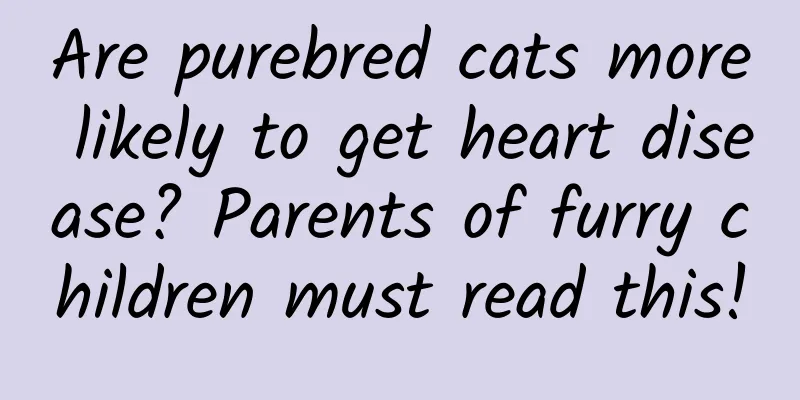Are purebred cats more likely to get heart disease? Parents of furry children must read this!

|
Author: Sinan, a pet nutritionist Reviewer: Liu Bo, China Agricultural University/Associate Professor "Cat heart disease" is not only the most common disease among domestic cats, but also one of the diseases with the highest mortality rate. Are purebred cats more likely to get heart disease? Is cat heart disease really all due to genetics? Today's article will dispel all the rumors about "cat heart disease" and solve the "heartache" of cat owners! Copyrighted stock images, no reproduction is authorized 01 Myth: Purebred cats are more likely to develop heart disease Analysis: Heart disease in cats is not associated with most breeds. Many cat owners lamented, "Are cats getting more and more delicate these days? Why haven't we heard of so many cases of heart disease before?" In fact, it is not that there are more heart diseases, but that there are more families with cats, cat owners are becoming more health-conscious, and medical standards have also made considerable progress. In the past, when a cat suddenly died, there might not be the conditions to investigate the cause, but now there are scientific methods to detect it earlier, and we feel that we are dealing with diseases more often. Cat owners also need to understand that cat heart disease is not related to most breeds. Whether it is a rural cat or a purebred cat, there is a certain probability of heart disease. As a cat owner, you should give your baby a physical examination on time, raise them scientifically, and do not abandon them. 02 Myth: Cat heart disease is genetic Analysis: In addition to genetic reasons, cat heart disease may be caused by a variety of reasons. Because cat heart disease is difficult to detect, cats with the disease may not show any symptoms in the early stages. Even if some careful cat owners can pay attention to the abnormalities of their cats, they can only watch their beloved pets die. At present, most cat heart diseases are idiopathic or primary, that is, the exact cause is unknown, but some cats with heart disease carry the disease-causing gene. Currently, the breeds reported include Maine Coon, Ragdoll and British Shorthair , but carrying the disease-causing gene does not necessarily mean that the cat will get sick. Purebred cats such as Persian cats, Bengal cats, Sphynx cats and Norwegian Forest cats are considered to have a higher risk of developing the disease. According to the current research progress, only Maine Coon and Ragdoll cats are supported for genetic testing. In addition, there are the following situations that pet owners should be wary of↓ ① Stress: Many cat owners like to take their cats to make new friends. However, unlike dogs, cats are solitary animals. Some so-called "social activities" are likely to cause stress in cats. Acute stress and severe tachycardia can reduce diastolic function, especially for cats with obese heart disease who already have symptoms of heart failure, which can aggravate their congestive heart failure. Eliminating useless social activities may be the easiest way for cat owners to protect their cats. ② Hyperthyroidism: Hyperthyroidism is the most common endocrine disease in cats over 8 years old. Thyroxine can directly stimulate myocardial cells, activate the sympathetic nervous system, and put the affected cat in a high metabolic state, thereby increasing the heart load and causing myocardial thickening. ③ Dietary taurine deficiency: Unlike dogs, cats cannot synthesize taurine themselves. If cats do not consume enough taurine in their daily diet, they will be more likely to develop dilated cardiomyopathy and eventually lead to heart failure. Currently, regular cat food contains sufficient taurine, so there is no need to supplement cats separately. However, in some low-quality cat food and canned cat food, taurine may not be added enough. If the cat owner fails to supplement it separately in time, the amount required by the cat's body cannot be met. Copyrighted stock images, no reproduction is authorized Common and Uncommon Feline Cardiomyopathy All heart-related diseases can be called heart disease. Feline cardiomyopathy is the most common type of heart disease in adult domestic cats. Including the well-known "hypertrophic cardiomyopathy", there are four main types of cardiomyopathy in domestic cats↓ The first type: Hypertrophic Cardiomyopathy (HCM), the most common, accounts for about 60% of all heart diseases. According to popular science data, the incidence of HCM in ordinary cats is about 15%, and the incidence in elderly cats is about 29%. The overall shape of the heart of a cat with mild HCM may not change much, but the inner wall of the heart thickens, resulting in a smaller left ventricular cavity and a decreased ability of the heart to transport blood. Eventually, heart failure will occur, and it is often accompanied by the occurrence of blood clots. The second type, restrictive cardiomyopathy (RCM), is less common. In this type of cardiomyopathy, scar tissue in the myocardium makes the muscle stiff and inelastic, which also limits the normal functioning of the heart, resulting in a decrease in blood transfusion capacity and eventually heart failure. The third type: dilated cardiomyopathy (DCM), is even rarer. In patients with this type of heart disease, the heart becomes larger overall, the myocardium becomes thinner, weaker and unable to pump blood effectively, eventually leading to heart failure. The fourth type: Arrhythmogenic Right Ventricular Cardiomyopathy (ARVC), which is rare . Cats with this disease experience dilation of the right ventricle and right atrium, thinning of the right ventricular wall, and usually right heart failure. In addition, cats may present with unclassifiable cardiomyopathies, which are classified as “nonspecific phenotypic cardiomyopathy .” In addition, cats may also develop myocarditis and infectious myocardial disease. Copyrighted stock images, no reproduction is authorized in conclusion Cat heart disease may be caused by many reasons, not necessarily due to genetics. Whether it is a rural cat or a purebred cat, there is a certain probability of heart disease. The most common type of heart disease in adult domestic cats is feline cardiomyopathy, which mainly includes hypertrophic cardiomyopathy, restrictive cardiomyopathy, dilated cardiomyopathy, and arrhythmogenic right ventricular cardiomyopathy. Cat owners should raise their furry children scientifically and take them for regular physical examinations. The article is produced by "Science Refutes Facts" (ID: Science_Facts). Please indicate the source when reprinting. The cover image and images within this article are from the copyright gallery. Reprinting and quoting them may lead to copyright disputes. |
<<: Besides hot pot, what else can mushrooms be used for?
>>: Childhood memories, why is "killing" so important?
Recommend
Wisdom is back! She is 74 and brought a new partner and laid an egg
Wisdom is back - at 74, she's brought a new m...
10 tips for short video operation and promotion!
This is an article for short video newcomers! But...
Baidu promotion Juping advertising delivery mode, targeting method, and selling price!
1. Delivery 1) What are the different modes of Ju...
A complete guide to mobile DSP advertising in 10 major industries!
More and more industries are beginning to enter t...
How to build a content system for B2B customer acquisition?
For B-side customer acquisition, the WeChat ecosy...
Analyze these 4 factors of the viral growth model
What is Growth Hacking ? This concept originated ...
Creative Sound BlasterX H5 Review: Wake Up Your Sleep
With the rapid development of software and hardwa...
2022 Virtual Project Practical Guide, How to Build a Store with a Monthly Income of Ten Thousand Yuan from Scratch for Beginners [Video Course]
2022 Virtual Project Practical Guide, Novices Cre...
Tutorials can make or break a game: A brief analysis of the design of a tutorial for new players
Have you ever had this experience? When you are ex...
23 tricks to grab user fans, how many of them have you fallen into?
"How can I get others to pay attention to my...
When you fall down due to high-voltage wires, don’t run. The standard life-saving posture is so funny?
High-voltage wires are dangerous. It is common se...
A comprehensive analysis of product operations!
If a product is produced but cannot fully reach u...
Owls 6 million years ago didn’t work the night shift?
◎ Science and Technology Daily reporter Lu Chengk...
Can Didi maintain its original intention in the post-unicorn era?
At 10pm on Saturday, Beijing Chaoyang Joy City en...
Have you ever been deceived by "survivor bias"?
Survivorship bias in all areas of life Abound &qu...









